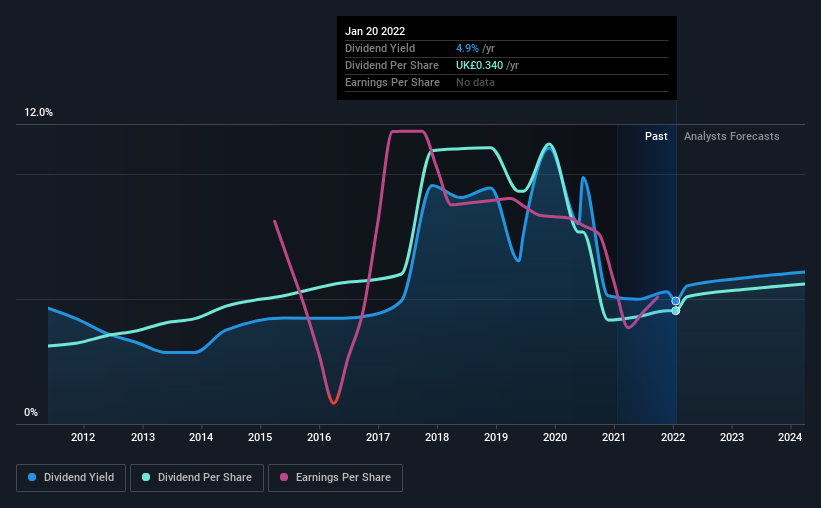- United Kingdom
- /
- Diversified Financial
- /
- LSE:PAY
PayPoint (LON:PAY) Is Paying Out A Larger Dividend Than Last Year

PayPoint plc (LON:PAY) will increase its dividend on the 7th of March to UK£0.085. This makes the dividend yield 4.9%, which is above the industry average.
Check out our latest analysis for PayPoint
PayPoint's Dividend Is Well Covered By Earnings
While it is great to have a strong dividend yield, we should also consider whether the payment is sustainable. Based on the last payment, the dividend made up 95% of cash flows, but a higher proportion of net income. While the cash payout ratio isn't necessarily a cause for concern, the company is probably focusing more on returning cash to shareholders than growing the business.
Over the next year, EPS is forecast to expand by 57.1%. Assuming the dividend continues along the course it has been charting recently, our estimates show the payout ratio being 64% which brings it into quite a comfortable range.

Dividend Volatility
Although the company has a long dividend history, it has been cut at least once in the last 10 years. Since 2012, the first annual payment was UK£0.23, compared to the most recent full-year payment of UK£0.34. This means that it has been growing its distributions at 3.8% per annum over that time. The dividend has seen some fluctuations in the past, so even though the dividend was raised this year, we should remember that it has been cut in the past.
Dividend Growth May Be Hard To Achieve
With a relatively unstable dividend, it's even more important to see if earnings per share is growing. However, PayPoint has only grown its earnings per share at 3.1% per annum over the past five years. The earnings growth is anaemic, and the company is paying out 104% of its profit. Limited recent earnings growth and a high payout ratio makes it hard for us to envision strong future dividend growth, unless the company should have substantial pricing power or some form of competitive advantage.
The Dividend Could Prove To Be Unreliable
Overall, we always like to see the dividend being raised, but we don't think PayPoint will make a great income stock. The track record isn't great, and the payments are a bit high to be considered sustainable. We would probably look elsewhere for an income investment.
Market movements attest to how highly valued a consistent dividend policy is compared to one which is more unpredictable. Meanwhile, despite the importance of dividend payments, they are not the only factors our readers should know when assessing a company. For example, we've picked out 3 warning signs for PayPoint that investors should know about before committing capital to this stock. Looking for more high-yielding dividend ideas? Try our curated list of strong dividend payers.
New: Manage All Your Stock Portfolios in One Place
We've created the ultimate portfolio companion for stock investors, and it's free.
• Connect an unlimited number of Portfolios and see your total in one currency
• Be alerted to new Warning Signs or Risks via email or mobile
• Track the Fair Value of your stocks
Have feedback on this article? Concerned about the content? Get in touch with us directly. Alternatively, email editorial-team (at) simplywallst.com.
This article by Simply Wall St is general in nature. We provide commentary based on historical data and analyst forecasts only using an unbiased methodology and our articles are not intended to be financial advice. It does not constitute a recommendation to buy or sell any stock, and does not take account of your objectives, or your financial situation. We aim to bring you long-term focused analysis driven by fundamental data. Note that our analysis may not factor in the latest price-sensitive company announcements or qualitative material. Simply Wall St has no position in any stocks mentioned.
About LSE:PAY
PayPoint
Engages in the provision of payments and banking, shopping, and e-commerce services and products in the United Kingdom.
Moderate with reasonable growth potential.
Market Insights
Community Narratives



